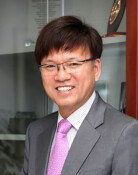[Editorial] Genuine Participatory Democracy Starts with National Unity
[Editorial] Genuine Participatory Democracy Starts with National Unity
Posted February. 24, 2003 22:43,
All the Koreans watching the inauguration of a new president have always the same desire toward the new president and the new government. Regardless of whom they supported for at the presidential election, they hope that the new president will lead the nation to the right direction. A public opinion poll, which was released yesterday, showed that 84 percent of the respondents said the Roh`s government would perform well in managing the nation. The optimistic public view on the incoming government is not a simple assessment and outlook, but a desperate hope and desire for the new president. When it comes to praying for the nation, yesterday`s friends and foes are no longer meaningless.
President Roh Moo-hyun should bear in mind the fact that 76 percent of the respondents expressed their concerns over social instability caused by unreasonable reforms, political unrest by political conflicts between the ruling and the opposition parties, rising tensions on the Korean Peninsular, worsening relations with the U.S. and economic uncertainties by business reforms and management and labor problems. He should not overlook the fact that not only those who did not support, but also supported him at the presidential election expressed their concerns about the future course of the nation under his leadership.
In fact, as a minority ruling party, the new government faces a lot of daunting tasks down the road. Perhaps, the new government launches in a more critical and miserable conditions at home and abroad compared to the outgoing Kim Dae-jung`s government. The incoming government`s difficulties do not simply mean pressing problems and challenges that it should cope with. Five years ago, the Kim`s government could unity the nation under the same banner to overcome the country`s economic crisis. However, it is not the case for the new government and which may pose a great burden. In addition, that is another factor in causing public concerns.
Against this backdrop, it is an ideal choice for the new government to declare the new government as a government promoting more public participations in national affairs. The new government`s administration goal for enhancing a participatory democracy in the Korean politics can be interpreted as a move to overcome the ruling party`s political weakness as a minority party at a time when the opposition party controls the National Assembly and maximize the government`s capability of pushing for reforms. However, if the public fails to follow the government because of misgivings and mistrust, there will be limits to voluntary public participations in national politics. Without voluntary public participations, any success in reforms cannot be guaranteed at all.
In case of the nation divided by regional rivalries, political ideologies and so on, it is indeed impossible to induce a general public participation in state affairs, although it may be possible to attract some parts of the public to certain issues. If the new government pushes for reforms only resorting to people who support it, such an attitude will cause more public concerns and social conflicts. In a nutshell, national unity is not only a starting station but also a terminal station of a genuine participatory democracy and reforms.
Previous administrations stated with ambitious reform agendas only to fail their reforms because they failed to unity the nation in the first place. In particular, the political confrontations concerning the outgoing government`s sunshine policy of engaging the North with economic incentives caused a serious division in public opinions. In light of the fact, the Roh`s administration has a responsibility for consolidating a negative inheritance from the outgoing government. In addition, it should make vigorous efforts to narrow generation gaps and social stratum gaps that emerged before and after the presidential election.
As the president once called himself as “half president,” success in his reforms will depend heavily on whether he can induce participations from the other half of the nation. To that end, he should not show hostility toward those who raise their objections to the pace of and approaches to reforms. Rather, he should make efforts to mollify public concerns and misgivings through persuasion and public consensus.
Among the dissenters, the press and the opposition parties are also included. Their reasonable objections should not be branded as anti-reform forces or the conservatives. If there is a pre-determined enemy in the process of pushing for reforms, the new government`s reforms will invite serious consequences in any case. The same is true of the family-controlled Korean business, chaebol reforms.
We hope that President Roh Moo-hyun`s resolutions at the inauguration ceremony will be a bit different from those of his predecessors and should be different. His five years in office will not be short or long. If the President bears his stepping down five years later at the moment of his inauguration, his chances of failures in reforms may be sharply reduced.







